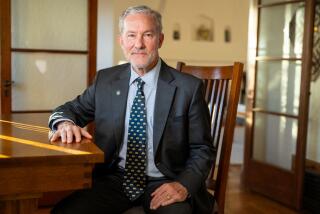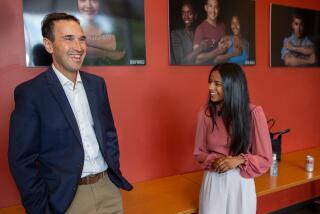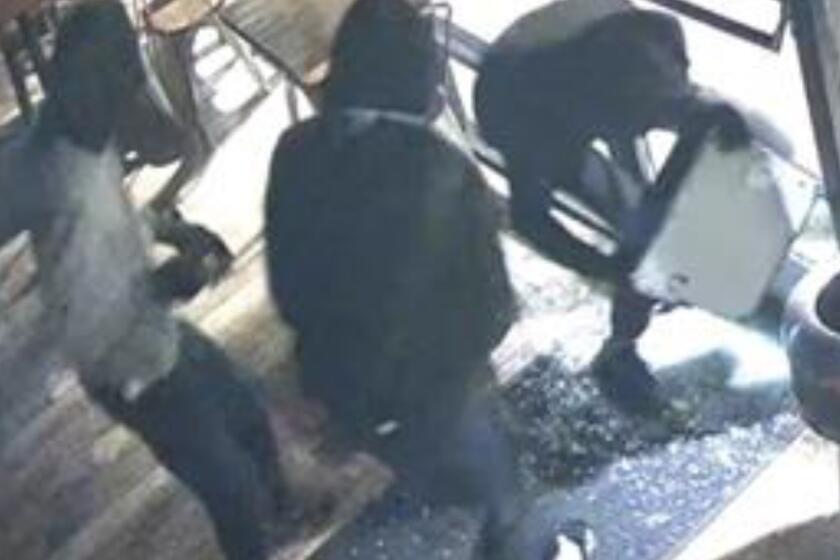Prof. Schwarzenegger gives a lecture on post-partisanship
Charisma counts. Former President Clinton proved it at the Democratic National Convention, and former Gov. Arnold Schwarzenegger proved it Monday at USC.
He received a standing ovation as he stepped onto the stage in an auditorium on campus for the start of a daylong symposium — the inaugural session of the augustly named USC Schwarzenegger Institute for State and Global Policy.
Gone was any evidence of the disaffection that he had accrued after seven years as governor. Gone was the shadow cast for his commuting the murder sentence of a friend’s son. Gone was the outrage over the news last year of his affair — and fathering a child — with a member of his household staff.
“I stand here today full of hope,” he said to the auditorium of nearly 750 people.
Forgiveness is sometimes easy in the face of hope, and the hope, as often is the case with Schwarzenegger, is that he can bring his Alpha-Dog personality to bear on the stickiest problems of the time.
He did it in the 1991 “Terminator 2” movie as a cyborg assassin assigned to protect the human race. He did it in 2003 when he defeated Gov. Gray Davis in a recall election, and now he is back ready to take on the environment, health and wellness, education, fiscal and economic policy and political reform.
On campus, Schwarzenegger will be known not only as the chair of the institute’s board of advisors, but also as a professor. The school recently named him the Gov. Downey Professor of State and Global Policy. The position was named for John Downey, who in 1860 was elected governor of California, and like Schwarzenegger, was an immigrant to this country.
As grandiose as his new title is, the institute is equally ambitious. After committing $20 million to the institute from his own wallet and the wallets of others, Schwarzenegger hopes to bring politicians and Hollywood movers and shakers to the table to discuss bipartisanship, or as he’s calling it, “post-partisanship.”
“We see the institute as a way to move ahead with a lot of the important initiatives that he continued or began as governor,” said longtime associate Bonnie Reiss, the institute’s director.
USC President C.L. Max Nikias introduced Schwarzenegger and praised his financial support and vision. Afterward, a short video played featuring a photograph of the former governor overlaid on a waving American flag and the words from his 2007 inaugural address:
“One of the great lessons I learned as governor of California was that the best solutions to common problems could only be found when each side was willing to engage thoughtfully and respectfully with each other.”
He spoke for 20 minutes. The audience — students and invited guests — occasionally interrupted him with applause as he laid out his goals in the form of a critique of politicians today who play it safe, more willing to fight for an ideology than find a compromise.
“If a soldier can risk his life for his country,” he asked later in the session, “why isn’t a politician willing to risk his office for making the right decision?”
In evidence was his trademark enthusiasm (“fantastic”) and his ability to be blunt. “Words without action is just poetry,” he said.
The event, divided into three panels, brought together politicians such as Sen. John McCain (R-Ariz.) and former Democratic Sen. Tom Daschle of South Dakota to diagnose the problems in Washington. An afternoon session featured record producer Jimmy Iovine and movie producer Brian Grazer to talk about innovation in industry.
Waiting in the stand-by line was junior Lindsay Rapkin, 20, who was intrigued at the prospect of seeing McCain and film director James Cameron, who had to cancel at the last minute.
“You don’t have to agree with his policies or how he ran the state in order to hope it does good things for USC and the School of Public Policy,” Rapkin said.
Graduate student, Laura Martinez, 23, signed up immediately upon hearing about the event. “This is not about Schwarzenegger,” she says. “It’s what he’s going to do. He’s started something bigger than himself.”
Media from about 40 outlets, including the Wall Street Journal, “Inside Edition,” the Daily Telegraph and Kleine Zeitung from Austria, were covering the symposium.
“Entertainment has become an important part of the news coverage,” says Barbara Gasser, a reporter for Kleine Zeitung. “This is what L.A. is known for, and we haven’t heard from Schwarzenegger since 2011. This is the first time in the limelight. No one thought we would see professor Schwarzenegger.”
After the morning session, USC history professor Kevin Starr praised the panelists. “It is important to acknowledge how a university environment brings out sides of our nature that is not seen in normal political discourse,” he said.
Afterward, people stepped outside and strolled to an open tent where lunch was being served. In the bright autumn sunlight, the campus was alive with skateboarders, bike riders and students oblivious to the gathering.
More to Read
Start your day right
Sign up for Essential California for news, features and recommendations from the L.A. Times and beyond in your inbox six days a week.
You may occasionally receive promotional content from the Los Angeles Times.







